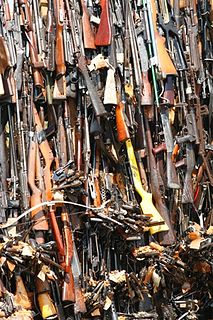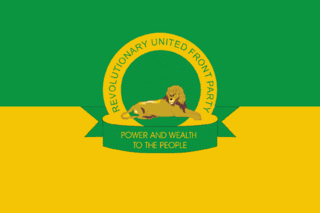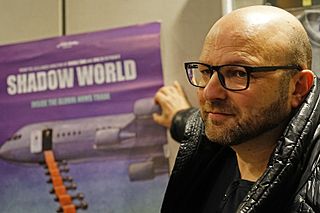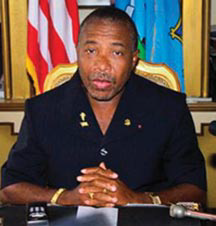
Arms trafficking, also known as gunrunning, is the trafficking of contraband weapons and ammunition. What constitutes legal trade in firearms varies widely, depending on local and national laws.
De Beers Group is an international corporation that specialises in diamond exploration, diamond mining, diamond retail, diamond trading and industrial diamond manufacturing sectors. The company is currently active in open-pit, large-scale alluvial, coastal and deep sea mining. It operates in 35 countries and mining takes place in Botswana, Namibia, South Africa and Canada. Until the start of the 21st century, De Beers effectively had total control over the diamond market as a monopoly. Competition has since dismantled the complete monopoly, though the De Beers Group still sells approximately 35% of the world's rough diamond production through its global sightholder and auction sales businesses.

Blood diamonds is a term used for a diamond mined in a war zone and sold to finance an insurgency, an invading army's war efforts, or a warlord's activity. The term is used to highlight the negative consequences of the diamond trade in certain areas, or to label an individual diamond as having come from such an area. Diamonds mined during the recent civil wars in Angola, Ivory Coast, Sierra Leone, Liberia, Guinea, and Guinea Bissau have been given the label. The term conflict resource refers to analogous situations involving other natural resources.
Guus Kouwenhoven, often misspelled as Gus Kouwenhoven or Guus van Kouwenhoven is a Dutch arms dealer convicted for arms trafficking in Liberia during the presidency of Charles Taylor.

Revolutionary United Front (RUF) was a rebel army that fought a failed eleven-year war in Sierra Leone, starting in 1991 and ending in 2002. It later developed into a political party, which still exists today. The three most senior surviving leaders, Issa Sesay, Morris Kallon and Augustine Gbao, were convicted in February 2009 of war crimes and crimes against humanity.

The Second Liberian Civil War began in 1999 when a rebel group backed by the government of neighbouring Guinea, the Liberians United for Reconciliation and Democracy (LURD), emerged in northern Liberia. In early 2003, a second rebel group, the Movement for Democracy in Liberia, emerged in the south, and by June–July 2003, Charles Taylor's government controlled only a third of the country.

The Sierra Leone Civil War (1991–2002) began on 23 March 1991 when the Revolutionary United Front (RUF), with support from the special forces of Charles Taylor’s National Patriotic Front of Liberia (NPFL), intervened in Sierra Leone in an attempt to overthrow the Joseph Momoh government. The resulting civil war lasted 11 years, enveloped the country, and left over 50,000 dead.

Global Witness is an international NGO established in 1993 that works to break the links between natural resource exploitation, conflict, poverty, corruption, and human rights abuses worldwide. The organisation has offices in London and Washington, D.C. Global Witness states that it does not have any political affiliation. Gillian Caldwell joined the organisation as Executive Director in July 2015 and Mark Stephens (solicitor) was appointed Chair in March 2016.

Since 1980, the Los Angeles Times has awarded a set of annual book prizes. The Prizes currently have nine categories: biography, current interest, fiction, first fiction, history, mystery/thriller, poetry, science and technology, and young adult fiction. In addition, the Robert Kirsch Award is presented annually to a living author with a substantial connection to the American West. It is named in honor of Robert Kirsch, the Los Angeles Times book critic from 1952 until his death in 1980 whose idea it was to establish the book prizes.
A new civil war began in 1999 when a rebel group backed by the government of neighboring Guinea, the Liberians United for Reconciliation and Democracy (LURD), emerged in northern Liberia. By the spring of 2001, they were posing a major threat to the Taylor government. Liberia was now engaged in a complex three-way conflict with Sierra Leone and the Guinea Republic. By the beginning of 2002, both of these countries were supporting the latest addition to the lexicon of Liberian guerrilla outfits – Liberians United for Reconciliation and Democracy (LURD), while Taylor was supporting various opposition factions in both countries. By supporting Sierra Leonean rebels, Taylor also drew the enmity of the British and Americans.

Andrew Josef Feinstein is a former South African politician who currently resides in the United Kingdom, but remains a South African citizen.

United Nations Security Council resolution 985, adopted unanimously on 13 April 1995, after reaffirming resolutions 813 (1993), 856 (1993), 866 (1993), 911 (1994), 950 (1994) and 972 (1995), and 788 (1992) which imposed an arms embargo on Liberia, the Council established a Committee to monitor the implementation of the embargo and extended the mandate of the United Nations Observer Mission in Liberia (UNOMIL) until 30 June 1995.

United Nations Security Council resolution 1020, adopted unanimously on 10 November 1995, after recalling all resolutions on the situation in Liberia, particularly 1001 (1995), the Council discussed the implementation of the peace process during the First Liberian Civil War and adjusted the mandate of the United Nations Observer Mission in Liberia (UNOMIL) to include other functions.

United Nations Security Council resolution 1100, adopted unanimously on 27 March 1997, after recalling all resolutions on the situation in Liberia, particularly Resolution 1083 (1996), the Council extended the mandate of the United Nations Observer Mission in Liberia (UNOMIL) until 30 June 1997.

United Nations Security Council resolution 1521, adopted unanimously on 22 December 2003, after recalling all previous resolutions on the situation in Liberia and West Africa, the Council established a monitoring body to oversee international sanctions against Liberia. It was the final Security Council resolution adopted in 2003.

United Nations Security Council Resolution 1688, adopted unanimously on June 16, 2006, after recalling all previous resolutions on the situation in Liberia, Sierra Leone and West Africa, including resolutions 1470 (2003), 1508 (2003), 1537 (2004) and 1638 (2005), the Council approved the transfer of former Liberian President Charles Taylor to the Special Court for Sierra Leone which was moved to The Hague in the Netherlands, due to security concerns.
United Nations Security Council Resolution 1760 was unanimously adopted on 20 June 2007.
United Nations Security Council Resolution 1819 was unanimously adopted on 18 June 2008.












